How Did This Year’s World Cups Get So Weird?
- Oops!Something went wrong.Please try again later.
This article originally appeared on Climbing
One could make a case for 2019--three years ago--being the last time an IFSC World Cup season felt normal. That year was full of historic stories (Slovenia's Janja Garnbret sweeping the Boulder season) and surprises (South Korea's Chaehyun Seo bursting onto the scene as a rookie and winning four events). But most importantly for the discussion at hand, 2019 delivered a full plate of events, with consistent rosters and just the right dose of good drama for the entirety of the season.
The following year, 2020, had the wrong kind of drama with the onset of the COVID-19 global pandemic and the resultant cancellation of the World Cup season (except for a singular, strange event in Briancon). And the next year, 2021, saw many World Cup competitors participating only in a fraction of events before diverting from the World Cup circuit to the postponed Tokyo Olympics.
Ah, but this season, 2022, was going to be different! There were no Olympics to distract and divert anyone's attention--fans or media or competitors alike--nor any sort of Olympic qualification pathway to disrupt the World Cup proceedings. Additionally, and best of all, the lingering pandemic felt more manageable, and competitors were (presumably) anxious and excited to return to a full and robust World Cup loop once again.
Yet this 2022 season proved to have plenty of strangeness of its own. It wasn't a disaster of a season by any means; it had its jaw-dropping moments, but it also proved that the competition circuit is still in somewhat of a dizzy tailspin, the same one it has been in for three years. Worse, there's not really any singular entity to blame; the season was just plain weird.
Star-studded, kind of
The 2022 World Cup season kicked off with a Boulder event in Meiringen in early April, an event that the aforementioned Janja Garnbret won handily. Garnbret was the only competitor to top every boulder in that World Cup, and for a brief moment, everything felt normal again.
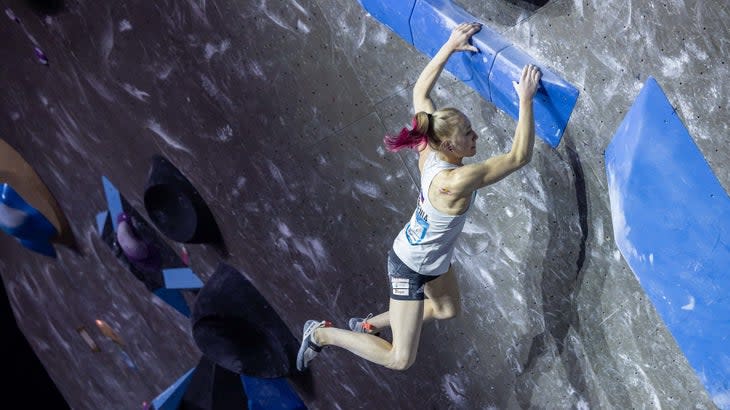
But then, suddenly, those feelings of normalcy got up-ended. Moments after winning that first event of the 2022 season, Garnbret announced she'd be taking a break from future World Cup events--and that's exactly what she did; she remained absent from competition for three months. Of course, nobody is criticizing her decision to take that hiatus, particularly since she hinted at it being a matter of her mental health. "Garnbret deserves credit for having the self-awareness and willingness to act when more rest and self-care is needed," Climbing reported at the time. But there's no denying that Garnbret is the World Cup circuit's biggest star, the marquee name that conjures up comparisons to Serena Williams, Michael Phelps, Simone Biles, Michael Jordan, and other all-time climbing greats. Garnbret's abrupt absence from the competition circuit left a void and had the bizarre effect of making her an even bigger talking point by not even being at World Cups. Weird, right?
Much credit is due to Team USA's Natalia Grossman, who not only filled the void of Garnbret's absence from a performative level, but became a marquee name in her own right as the Boulder season progressed. By the numbers, Grossman became "American climbing royalty" when she notched back-to-back annual wins at the Salt Lake City World Cups. In fact, she ended up winning every Boulder event after the Meiringen World Cup, but more remarkably, made a lot of fans forget about Garnbret's absence completely. Grossman's utter dominance was perhaps the most surprising story of the whole year, in the best way possible.
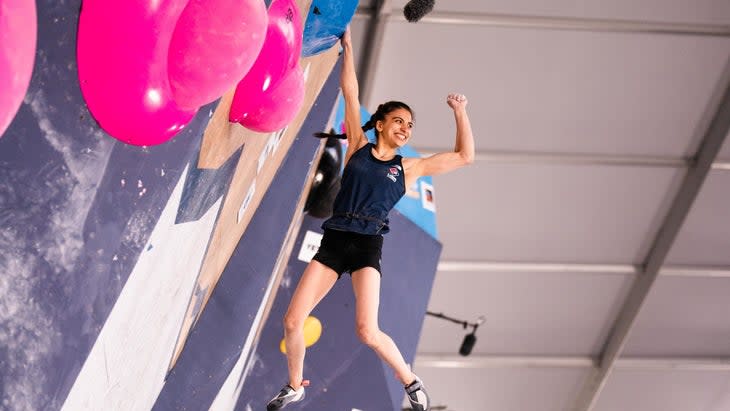
As for Janja Garnbret, well, she did eventually return to the 2022 World Cup circuit, starting with a Lead event in Innsbruck in late June. And she emphatically won that event--climbing more than 10 holds higher than anyone else. And for a brief moment, everything felt normal once again. But then, as the Lead season neared its conclusion, Garnbret got beaten--twice--by Japan's Ai Mori,
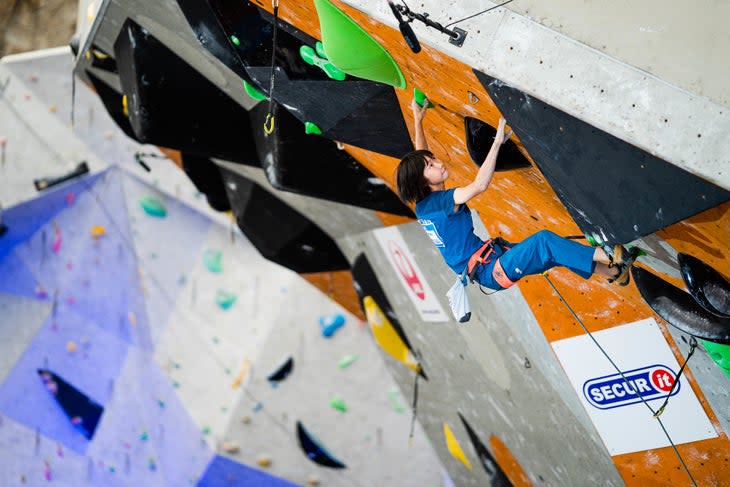
a late addition to the World Cup roster. Mori didn't exactly come out of nowhere--she's been a strong force on the competition circuit for years--but considering that her last World Cup appearance was back in 2019, well, it kind of felt like she came out of nowhere. And just as fans were warming up to a budding rivalry between Mori and Garnbret, Mori departed from the scene yet again and was absent from the final World Cup of the season, a brutally muggy and frustratingly rainy affair that Garnbret won in Jakarta. For what it's worth, Natalia Grossman was absent from that final World Cup in Jakarta too, as was her American compatriot Brooke Raboutou. This all contributed to the entire Lead season concluding with something of an anticlimax. Yes, 2022 started with a bang, but it kind of ended with a fizzle.
Speed rules
In some ways, the Speed discipline carried more weight this season than ever before, thanks mainly to the spotlight that the Tokyo Olympics gave the discipline approximately one year ago. (Let's not forget that Spain's Alberto Gines Lopez won the Olympic gold medal in 2021 thanks largely to a series of victorious Speed runs.) On the heels of that, the overarching Speed story in 2022 was the smashing of world records: Poland's Aleksandra Miroslaw set a women's record at a World Cup in Salt Lake City in May with a run of 6.53 seconds, and Indonesia's Kiromal repeatedly broke the men's record, starting with a blistering run at a World Cup in Seoul in May.
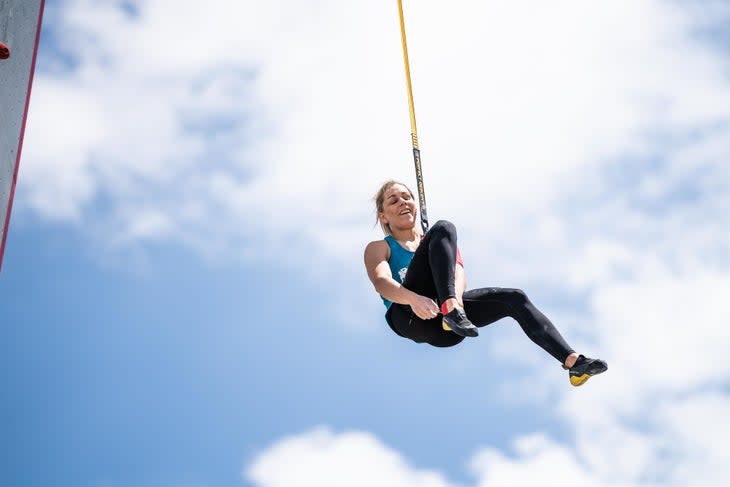
But even the Speed discipline ended on a rather peculiar note; Miroslaw, for instance, did not take part in any other World Cups after Salt Lake City. Katibin clocked a time of 5.00 seconds in July, prompting hype, speculation, and anticipation for when he--or another competitor--might break the hallowed "5-second" barrier in the men's division. As Climbing pontificated, this would essentially be speed climbing's version of running the sub-4-minute mile, a feat once thought to be physiologically impossible...until it happened. And since Katibin had broken climbing's Speed world record five times in two months in 2022, the rampant fan buzz was justified.
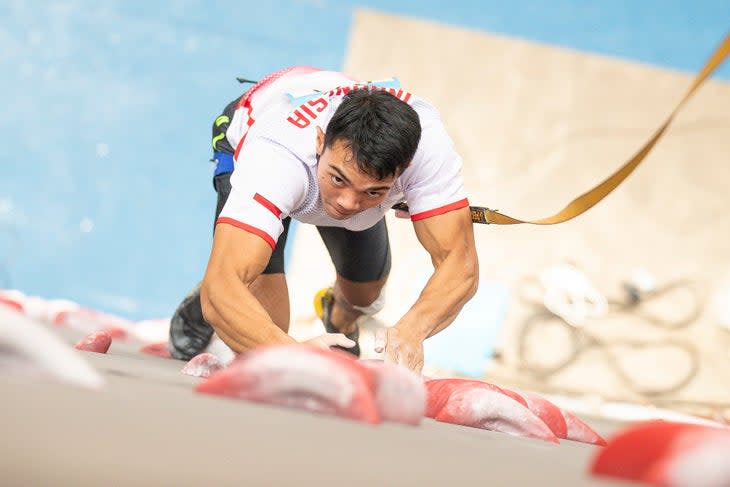
Sadly, the anticipation would also go unfulfilled, as the Speed season would conclude without anyone breaking the 5-second mark. (Katibin actually appeared to be on world record pace in the last race of the season--the Big Final of the Jakarta World Cup--but slipped midway up the route.)
As of now, the men's world record still stands at 5.00 seconds, and while that helps drum up some hype for the 2023 season, it means that fans' hope and stoke for another world record has been on a steady comedown since July.
Season fatigue
While we're on the subject of the men's division, let's talk about how it lacked consistency throughout most of the 2022 season. Just think, the women's division had Janja Garnbret as its virtuosic anchor--and even in Garnbret's aforementioned absence, Natalia Grossman was quick to slip into the role with great steadiness in the Boulder discipline. And Ai Mori certainly proved to be an unwavering presence at the top of the Lead discipline for the women.
But the men's division was more like a pick'em in every competition, evidenced by the fact that a different man won every Boulder event. On the surface, such variety is not necessarily a bad thing; there's an element of fun to that sort of unpredictability.
Yet, the history of competition climbing shows that consistency drives fan interest. That was true when France's Francois Legrand was winning Lead World Cups in the early 1990s; it was true when Austria's Angela Eiter was vying for a Lead season streak in 2005 or when her compatriot, Anna Stohr, was vying for a Boulder season streak in 2013; and it was true when Janja Garnbret was on her way to successfully sweeping the Boulder season in 2019.
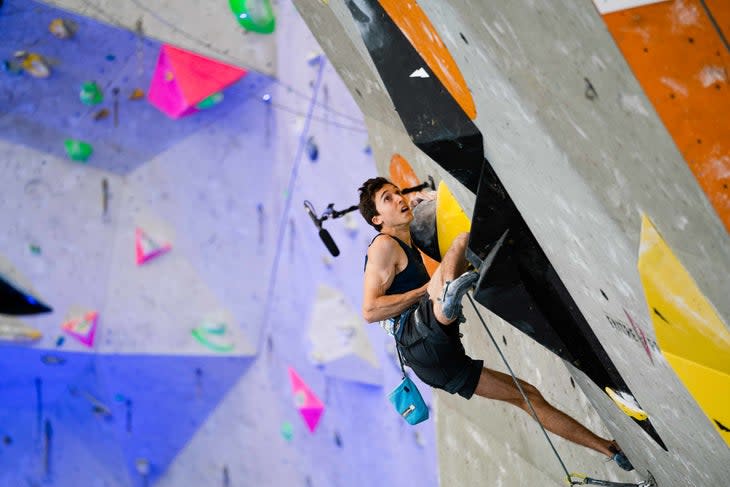
Sure, there was a bit of consistency in the men's Lead division this year. For example, Team USA's Jesse Grupper won two events. But there was also a pervasive feeling of burnout, at least from the outside looking in. For instance, at a Lead World Cup in Koper in early September, Team USA only had a roster of three competitors in the men's division, compared to a roster of twice that (six men) at the first Lead World Cup of the season. Other individual competitors and national teams had big fluctuations in attendance throughout the season as well. Consider that the Czech Republic's Adam Ondra won the Lead event in Chamonix in early July, but then didn't take part in any Lead World Cups for the remainder of the season.
If general circuit fatigue is partly to blame, some castigation might be due to the pervading importance of the combined discipline. After all, the Lead, Boulder, and Speed disciplines were combined at the Tokyo Olympics, and Lead and Boulder will be combined again at the forthcoming Paris Olympics in 2024. In fact, a combined Lead and Boulder World Cup in Morioka, Japan, is slated for later this month. But that just adds to the weirdness, creating this sense that the World Cup season is still ongoing--when, in fact, all the non-combined World Cups have concluded.
More broadly, such enduring emphasis on combining the disciplines means that it benefited competitors to participate in both the Lead and the Boulder swings of the World Cup circuit to gain experience--and that equated to taking part in a lot of rounds at a lot of events this season. Widespread burnout was always a logical consequence.
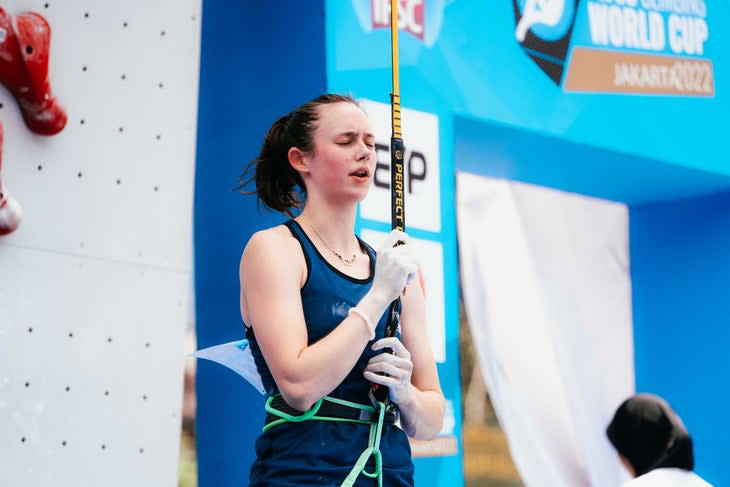
Still, the long season had plenty of positive aspects worth highlighting across the men's and women's divisions: Team China returned to the circuit in a big way following only intermittent appearances since the pandemic began. Team USA's Emma Hunt demolished the American Speed record yet again, while her Speed compatriot, Sam Watson, earned a gold medal at just 16 years old. Furthermore, 2022 was the best season that Team USA's Brooke Raboutou has ever had, evidenced by six podium appearances.
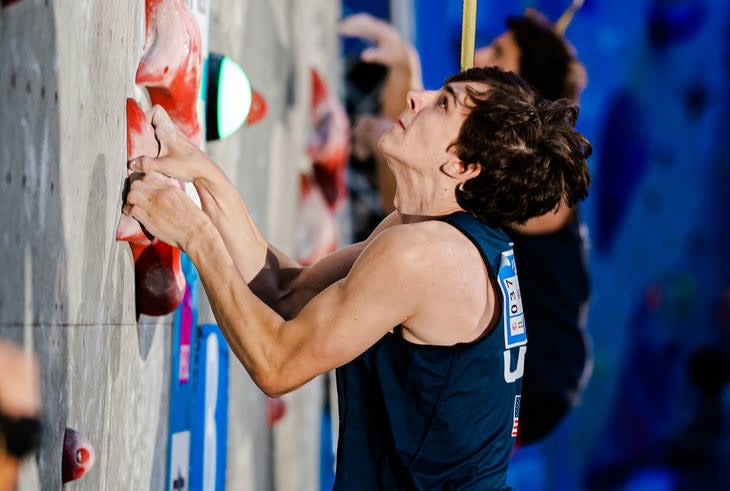
It's doubtful that the World Cup circuit will veer back towards normalcy in 2023, as Olympic qualification for those 2024 Paris Games will begin and it seems that scoring tweaks are still being made, or at least considered, to the forthcoming Olympics' format. If anything, things are likely to get even weirder in the coming year. But, hey, if you want to talk about it, you've come to the right place.
For exclusive access to all of our fitness, gear, adventure, and travel stories, plus discounts on trips, events, and gear, sign up for Outside+ today.

